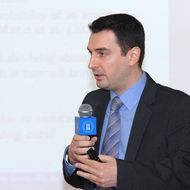- A
- A
- A
- АБB
- АБB
- АБB
- А
- А
- А
- А
- А
- Национальный исследовательский университет «Высшая школа экономики»
- Факультет экономических наук
- Департамент теоретической экономики
- Новости
- Публикация Эрэна Арбатли в European Economic Review
-
Департамент
- О департаменте
- Сотрудники
- Лучшие преподаватели
- Аспиранты
- Учебные курсы
- Конкурс ППС
- Планирование учебной нагрузки
- Наука в департаменте
109028, Москва,
Покровский бульвар 11, Администрация департамента: офисы S1029, S1030; тел: +7(495) 772-95-90 *27172, 27174, 27601, 28270
PhD, Университет Штата Пенсильвания
Департамент теоретической экономики объединяет высококвалифицированных специалистов в различных областях экономической теории, включая микро и макроэкономику, теорию денег и финансов, экономическую историю и историю экономических учений. Наша миссия — обеспечение преподавания экономических дисциплин в НИУ ВШЭ на уровне ведущих западных университетов с учетом специфики профилей подготовки студентов.
 Как богатые страны стали богатыми, и почему бедные страны остаются бедными. 11-е изд.
Как богатые страны стали богатыми, и почему бедные страны остаются бедными. 11-е изд.
Райнерт Э. С.
М.: Издательский дом НИУ ВШЭ, 2025.
Karpov A. V., Markström K., Riis S. et al.
Discrete Applied Mathematics. 2025. Vol. 370. P. 57-70.
Бондаренко К. А., Стародубцева М. Ф., Куприянов А. и др.
В кн.: Макроэкономика. Практикум странового анализа. М.: НИЦ Инфра-М, 2025. Гл. 2. С. 105-195.
Аналитические записки. 1. Банк России, 2024. № 10.
109028, Москва,
Покровский бульвар 11, Администрация департамента: офисы S1029, S1030; тел: +7(495) 772-95-90 *27172, 27174, 27601, 28270
PhD, Университет Штата Пенсильвания

Публикация Эрэна Арбатли в European Economic Review

Аннотация: Hezbollah, a Shia Islamist political party and militant group based in Lebanon, is believed to receive a significant amount of informal funding from Iran. In this paper we evaluate whether this funding has had any economically meaningful effect on subnational development in Lebanon. Since the amount of funding is not observed, we use Iranian oil rents and the intensity of sanctions against Iran as plausibly exogenous drivers of transfers to Hezbollah. Then, we leverage the well-established sectarian bias in Hezbollah’s spending to obtain conservative estimates of the direct effect of funding to Hezbollah. Studying the 1993-2010 period, we find a positive and economically significant relationship between Iranian oil windfalls and nighttime lights. This effect is significantly stronger in areas with greater concentration of Shia population. Also, nighttime lights are relatively lower in Shia areas than elsewhere during periods when sanctions against Iran intensified. These novel results attest to the non-negligible developmental effects of informal aid as well as how economic sanctions against donors might offset such effects.
Арбатли Джемаль Эрен
Департамент теоретической экономики: Доцент
- О ВЫШКЕ
- Цифры и факты
- Руководство и структура
- Устойчивое развитие в НИУ ВШЭ
- Преподаватели и сотрудники
- Корпуса и общежития
- Закупки
- Обращения граждан в НИУ ВШЭ
- Фонд целевого капитала
- Противодействие коррупции
- Сведения о доходах, расходах, об имуществе и обязательствах имущественного характера
- Сведения об образовательной организации
- Людям с ограниченными возможностями здоровья
- Единая платежная страница
- Работа в Вышке
- ОБРАЗОВАНИЕ
- Лицей
- Довузовская подготовка
- Олимпиады
- Прием в бакалавриат
- Вышка+
- Прием в магистратуру
- Аспирантура
- Дополнительное образование
- Центр развития карьеры
- Бизнес-инкубатор ВШЭ
- Образовательные партнерства
- Обратная связь и взаимодействие с получателями услуг
-
http://www.minobrnauki.gov.ru/
Министерство науки и высшего образования РФ
-
https://edu.gov.ru/
Министерство просвещения РФ
-
http://www.edu.ru
Федеральный портал «Российское образование»
-
https://elearning.hse.ru/mooc
Массовые открытые онлайн-курсы
- © НИУ ВШЭ 1993–2025 Адреса и контакты Условия использования материалов Политика конфиденциальности Карта сайта
- Редактору





